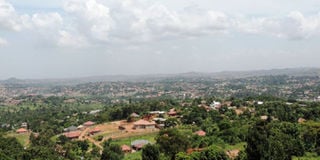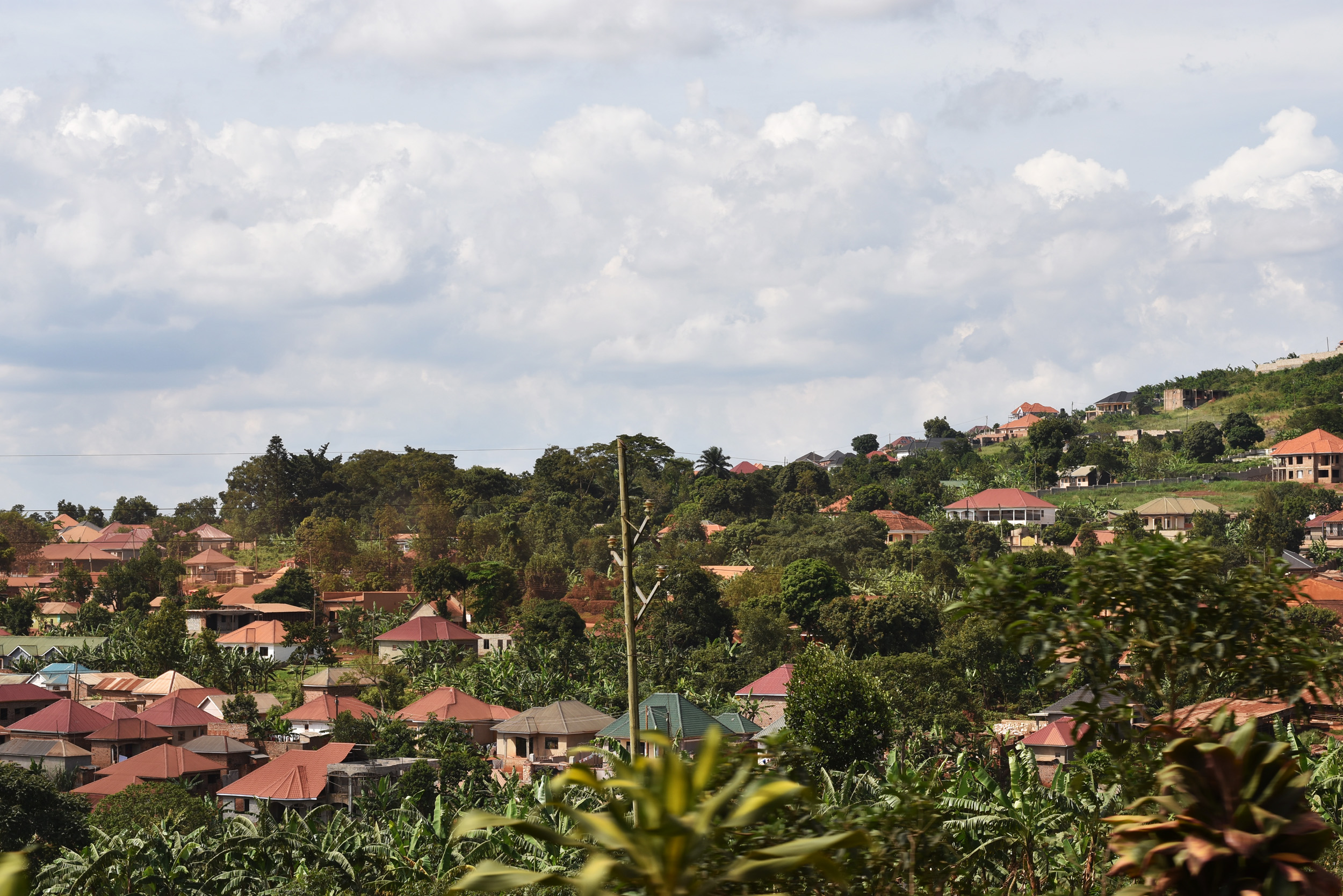Prime
This is why your property is not safe

Land in urban areas such as this is more prone to grabbing given its prime value. PHOTO/Gabriel Buule.
What you need to know:
The most vulnerable properties are those owned by absent landlords and undeveloped land without clear instruments of ownership such as land titles and verified agreements.
Property wrangles and grabbing are increasing every day and most property owners are becoming more anxious about the safety of their properties. What makes your property vulnerable to grabbers and how can you protect yourself?
Johnson Mutyaba, a Ugandan based in Ohio – USA acquired a property in Mukono District that comprised of one acre of land and 16 rentals. Because he could not supervise it due to the distance, he hired a manager to do it. He was however, shocked to discover that the property manager was attempting to lease part of the land using a photocopy of his land title.
“He told the buyers that I had bequeathed the property to him and that I had succumbed to Covid-19 and he was yet to receive the original title which would soon be sent to him via international courier DHL,” Mutyaba relates. Fortunately, Mutyaba was able to foil the manager’s plot and secure his property.
Two years later, Mutyaba is in another battle with a man who claims ownership saying that the property was sold to him fraudulently. The contender claims he had made partial payment on the property through a real estate dealer who later sold it to Mutyaba. He wants Mutyaba to refund the money he paid to the dealer or give up the property. Because of Mutyaba’s absence, this person keeps harassing the tenants and he recently fenced off part of the property.
Mutyaba is one of the many Ugandans affected by property grabbing which has been reported to deprive vulnerable Ugandans of their land rights and means of livelihood. Many times, they are summarily evicted because they do not possess a certificate of ownership to the land in question, others are bullied by more powerful individuals while others are lured into dubious transactions.
Inequities in land ownership and access have persisted in Uganda for centuries. In recent years, the situation has worsened due to the government giving away publicly owned land.
Why the rise
With several land grabbers on the prowl and multiple individuals claiming ownership of a single plot, an investor must comply with all legal formalities when investing in a plot to avoid illegal possession later.
Lawyer Nabuguzi Kiwanuka, explains that the trend of property grabbing is facilitated by political influence of the grabbers who thrive on their political connections to disenfranchise the less powerful.
“You cannot be safe with your property in a society where politics overpowers the law, for instance look at the infamous Lusanja land conflict where High Court judge, Justice Tadeo Asiimwe, eventually ruled that businessman Medard Kiconco was the lawful owner of the land and 127 residents were given up to 30 days to vacate it. It beats my mind how there is a claimant of the land and all people had to do was call for help from the president in a country where we have the judiciary,” she adds.
She adds that even Court judgements or the procedures of law, in most cases, are never functional or effective when one with political influence decides otherwise which effectively aids property grabbing.
Nabuguzi notes that buyesr are required to make a search from the land registry portal before making any transactions on land and yet the same statement of search, when issued, has an exclusion clause that states that the information therein is not conclusive. This clause exonerates the registry should cases of fraud arise based on that search.
“While the law demands that you go through a certain stage before land acquisition, the stage tells you that they are not sure. What that communicates to you is that even with the statement of search you may not really have the right information on the land you are buying,” she adds.
She notes that rightful property owners are barely protect their legal interest because they lack of the financial capacity to fund the various processes.
Property lawyer Nicholas Nsava Mbabazi, reveals that all properties in Uganda are currently vulnerable to grabbing because of scarcity of land and increasing property values.
He, however, says land in urban areas and the metropolitan Kampala area is more prone to grabbing given its prime value. Mbabazi notes that, the most vulnerable properties are those owned by absent landlords and undeveloped land without clear instruments of ownership such as land titles and verified agreements. While emphasising vigilance, stakeholders explain why your property could be prone to grabbing.
Encumbrances
Milly Nassolo, a lawyer notes that is easy to lose property because it has encumbrances such as liens, easements, leases, mortgages or restrictive covenants that were not revealed and resolved at the time of the transaction. She recommends that with property wrangles raising every day, property owners should retain the services of a lawyer to verify whether there is no claim attached to it.
“A lawyer can help you verify that the land is free from all encumbrances and the person you are dealing with is the actual owner of the property. They will also process all the necessary documents and the verification which would otherwise be difficult for you. It is important to periodically carry out a search about your land or property as a way of policing unprecedented claims and encumbrances,” she explains.
She notes that the search assists the owner to ascertain the right property ownership, establish its existence by identifying the conditions, caveats, pending rates, or encumbrances on the title.
Unscrupulous caretakers
Nassolo notes that properties that are entrusted with caretakers are usually prone to grabbing and the most victims have been Ugandans who buy from abroad and those who travel and entrust their properties with individuals. She adds that on most occasions, a property in the hands of a third party is usually susceptible to grabbing.
She advises that formal arrangements must be put in place to allow any person to take care of a property, especially for those who buy properties remotely.
She adds that an unscrupulous caretaker can at the end of the day claim to be a sitting tenant (Kibanja holder) or a bona fide occupant after a specific period of time. Bona fide occupancy can come into force when someone has clear claims of occupancy and utilisation or developing of any land unchallenged by the registered owner or agent of the registered owner for twelve years or more.
Mbabazi points out that families often fall into the trap of dishonest administrators who utilise the ignorance of the rightful property owners to steal properties. He reveals that a property is never safe with a dishonest estate administrator. He adds that incase the administrator seems suspicious, owners must move fast to legally recall them.
Vacant land in a developed community
Both Nassolo and Mbabazi agree that every land is vulnerable to grabbing, but mostly land that has not been registered and Bibanja holders that have no certificate of title.
“There is a tendency of people attempting to grab and when dragged to court, they conduct backroom talks with rightful owners promising to compensate them the right value of the property and this kind of property grabbing happens in developed urban centres where some landlords are reluctant to sale,” Mbabazi explains.
Mbabazi says one way of protecting such properties is mortgaging their titles to banks, noting that grabbers usually fear bank properties.
He adds that it is important for owners who have no money to develop their properties to caveat them for beneficiaries or ensure to regularly monitor them.
Nassolo advises Bibanja holders to get certificates of occupancy and also pay tenancy fees. And for those whose land is surrounded by developed properties but theirs is yet to be developed, they should fence it off and remain vigilant in their monitoring.
If you live far from your property, make a point to arrange periodic visits. In most cases where the owner does not conduct frequent trips to the particular property, someone else seizes it. In case you are unable to travel on a frequent basis, hire security services to monitor your property and update you regularly. Hiring service providers will cost you a surveillance fee, however, it will be a much better way to watch over your property.
“If you hire a property manager, they will be able to ensure that the property and its boundaries are maintained well and also collect collects rent, pays utilities, make repairs and superintend the property on your behalf,” she adds.
Dangerous
Land and property related disputes often result in the maiming, and even death of many innocent lives. A report by international justice mission on property grabbing in Uganda, reveals that in Mukono District alone, 18.3 per cent of victims of property grabbing reported attempts were made on their lives.
In the study’s review of police case files, more than half of property grabbing cases included physical violence and of all property grabbing cases opened between 2005-2009 and closed as of the time of the review (Sep-Nov 2012) that could be identified, located and had sufficient data to review, not one perpetrator was convicted of a property grabbing crime.
In Uganda, there were at least 17 land grabs since 2000 with contracts totalling 74,831 hectares of land, according to Land Matrix data.
According to the latest Uganda Police Crime report, a total of 332 cases of very serious land related crimes were reported in 2021 at CID headquarters alone compared to those reported in 2020, indicating a four percent increase.
Consequences
Some of the major consequences of property grabbing are the negative effects on the value of the sorrounding land impact on foreign investment.
“Before buying property some buyers reach out to locals to enquire about its status. If the property has a history of conflict, they tend to shy away even if the conflict was resolved. If the property remains unsold for a while it will make all the sorrounding properties unattractive and consequently lower their value. Similarly, if you are a foreign developer or foreign business in a country and you sense that property rights are not as respected and not as protected by the law, you are not going to take that risk, because you might end up losing your investment,” the expert notes.
This has a significant impact on the economy such as limited foreign investment, rising housing prices and loss of job creation.“
The law
Article 237(1) of the Constitution states that land belongs to the citizens of Uganda and Article 26(1) protects the right to own property either individually or in association with others for instance groups of people who hold land communally.
Legal advice
Before you plan to purchase a land, it is imperative to seek advice from legal experts. Share all the documents with the legal advisor and delve into know-how about the registration of the property with the district authority.
Also, ensure that the land is free from all encumbrances and the person you are dealing with is the actual owner of the property. An expert can help you with all the necessary documents and the verification, which would otherwise be difficult for you.




